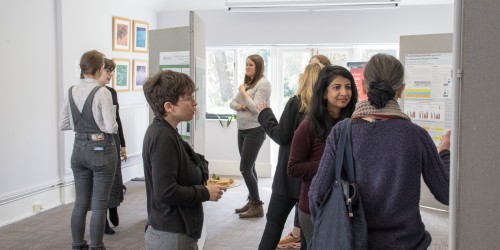
Lucy Cavendish College Research Day 2020
The Lucy Cavendish Research Day was organised by Research Fellow Dr Sarah Morgan
As part of International Day of Women and Girls in Science 2020, Sarah talks about her experience as a scientist
After taking an undergraduate degree in Physics, at the University of Exeter I moved to Cambridge University to do a PhD in Theoretical Physics. My PhD focussed on trying to understand how plants transfer energy from one place to another during photosynthesis. I was particularly interested in the idea that quantum mechanical effects might be involved.
During my PhD I became interested in the relatively new field of network science, and the idea that many biological systems can be thought of as complex networks. When I finished my PhD, I was offered a research job in the Cambridge Psychiatry department, studying how brain connectivity differs in patients with schizophrenia compared to healthy volunteers. To do this we use MRI brain images. This research is very different to anything I had done before, but it builds on the skills I learned during my Physics training, including computational skills, signal processing and data science techniques such as machine learning. Most of all, it requires the ability to problem solve, and extract interesting patterns from complex data, both of which physicists are very good at!
In 2017, I was fortunate to win a Henslow Research Fellowship at Lucy Cavendish College, funded by the Cambridge Philosophical Society, to continue this research independently.
At the moment, my research focuses on two main themes. The first is using MRI brain images to better diagnose and understand schizophrenia. To do this I work as part of an EU-funded project called PSYSCAN (http://psyscan.eu/). We recently published some initial results from the project (https://www.pnas.org/content/116/19/9604), showing a pattern of structural brain differences between patients with schizophrenia and healthy volunteers, which were remarkably reproducible across three independent datasets. We then related these structural brain differences to gene expression data, to uncover a cluster of genes which we believe merit further attention as potential anti-psychotic drug targets. The next step is to extend this research to new data from the PSYSCAN project, which includes brain images from over 500 subjects who either have early stage psychotic disorders or are at clinical high risk of developing them.
I also lead a project using speech from patients with psychotic disorders to predict their disease progression, funded by The Alan Turing Institute (https://www.turing.ac.uk/research/research-projects/towards-incoherent-speech-predictor-psychosis-risk).
I’ve been lucky to experience two different Cambridge departments- Physics and Psychiatry- and I’ve enjoyed working in both. In both places I’ve had a lot of independence to work on problems I find interesting, as well as fantastic colleagues to discuss ideas and results with.
Whilst I was in the Physics department, I co-founded the Cambridge group for women and non-binary people in Physics (https://www.cavendishinspiringwomxn.co.uk/). That was a brilliant way to meet other women and to support each other through the ups and downs of research.
I am currently organising the 2020 Lucy Cavendish College Research Day. Events like this help to further people’s understanding of research, from methodologies to the application of outcomes.
I really enjoy being a scientist- I have always liked puzzles and problem solving and I feel privileged to be paid to study something as fascinating as the human brain. I think women do face particular challenges in science, and there is definitely still work to be done to improve the working environment for women in STEM, but there is also a lot of support out there. By working together we can make STEM more welcoming for everyone.